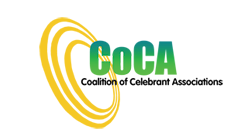The Hon Nicola Roxon
Attorney-General
Parliament House
Canberra ACT 2600
Re: Commonwealth Marriage Celebrants as Officers of the Commonwealth
Dear Attorney
The Coalition of Celebrant Associations (CoCA) is writing to seek clarification of the status of Commonwealth Marriage Celebrants as Officers of the Commonwealth.
At the 19 April 2012 meeting with the Attorney-General’s Department, CoCA raised the matter of Commonwealth Marriage Celebrants acting as Officers of the Commonwealth while fulfilling their responsibilities as Marriage Celebrants.
Since that meeting, the High Court of Australia, in its judgement in the Williams v Commonwealth of Australia [2012] HCA 23 (20 June 2012) matter1, dealt with the issue of whether chaplains appointed under the Chaplaincy in Schools program were Officers of the Commonwealth. By so doing the High Court noted a number of criteria to assess whether a person held “office … under the Commonwealth”.
While not an exhaustive definition, The High Court noted the following criteria:
-
“An “ office“ is a position under constituted authority to which duties are attached [584]. That suggests that
an “officer” is a person who holds an office which is in direct relationship with the Commonwealth and to which qualifications may attach before particular appointments can be made or continued.”Paragraph 444
-
The need for a “legal relationship” with the ‘officer’ and the ability to “appoint, select, approve or dismiss” such officers. Paragraph 445[A1]
-
“Under which particular standards are stipulated, and under which reporting obligations are created to ensure compliance with those standards. Paragraph 446
Being Marriage Celebrants appointed by the Commonwealth Attorney-General’s Department would appear therefore to fit the definition of “Officers of the Commonwealth”.
The Regulation Impact Statement (RIS), prepared by the Department to justify the imposition of a professional celebrant fee for full cost recovery purposes, supports the above criteria. The RIS stated:
-
“The Commonwealth has constitutional responsibility for marriage matters including the Marriage Celebrant Program.”
-
“It is administered by the Attorney-General’s Department.” 2 ( NB: The Marriage Act 1961 and marriage law policy is the responsibility of the Attorney-General who appoints and directs staff to administer The Marriage Celebrant Program)
-
“All persons conducting marriages in Australia must be authorised to do so under the Marriage Act 1961 (the Act)2
-
“Completion of a prescribed training course in order to be registered as a celebrant (from 2010 this has required a Certificate IV in Celebrancy)”.2
-
“A statutory application process for registration, including criteria for assessing the suitability of applicants to be registered as Marriage Celebrants.” 2 ( NB: This involves the Department selecting only those marriage celebrant applicants considered “Fit and proper persons” by Commonwealth Registrar of Marriage Celebrants under Section 39C of the Marriage Act 1961)
-
“Public listing of approved celebrants on a Register of Marriage Celebrants.”2
-
“A requirement for celebrants to undertake a minimum of 5 hours of professional development each year”.2 ( NB: Ongoing Professional Development includes a compulsory component. Failure to complete OPD can be grounds for dismissal.)
-
Compliance with a statutory Code of Practice.” 3
-
“A complaints process which enables complaints to be lodged against celebrants regarding their solemnization of marriage ceremonies. “3
-
“Review of the performance of each individual marriage celebrant against statutory criteria at least every five years.“3 See NOTE
-
“Availability of disciplinary measures against Marriage Celebrants who fail to meet their statutory obligations (including suspension and deregistration)”. 3 (NB: This constitutes dismissal) and
-
“A right of appeal for Marriage Celebrants to the AAT against decisions to reject their application for registration or to suspend or deregister them.” 3
The Department justified the new policy of cost recovery in its Regulation Impact Statement (RIS), quoting:
-
“These requirements are necessary and appropriate for the authorization and monitoring of private citizens who perform significant legal responsibilities where failure to properly perform those responsibilities can have a significant negative impact on members of the public”.3
-
“Marriage Celebrants have a number of significant legal responsibilities in conducting marriages” 3 as “Marriage results in a change of legal status for the parties to it and often a change of name for one party” 3. Marriage Celebrants “must satisfy themselves as to the identity of each party they marry. There is no subsequent official confirmation that the individuals a celebrant names in a marriage certificate are who they claim to be.” 3 (NB: Marriage Celebrants are also designated to witness Commonwealth Statutory Declarations and are called upon to verify Lodgement of Notice of Intended Marriage by the Commonwealth Department of Immigration in spousal visa cases.)
-
“Other significant and potentially complex legal responsibilities include ensuring the full and free consent of each of the parties to a marriage, that the parties are aged over 18 years and not closely related and that neither party is currently married. Fulfilling these obligations often requires celebrants to examine and assess foreign identity, marriage and divorce documents. Celebrants need to also ensure that the parties’ marriage vows meet minimum requirements, prepare marriage certificates (which are identity documents) and send marriage certificates and other documents to registering authorities following the marriage ceremony”.3
-
“Under the Act marriages may be invalid if they do not meet specific legislative requirements for solemnization. The use of vows in marriage ceremonies is considered a key element in establishing consent before witnesses”.3
The Department, as quoted from the RIS, fully expected that:
-
The option of charging Commonwealth celebrants a substantial annual fee “would be likely to impose some additional cost on marrying couples as celebrants would be likely to pass on the cost of the fee in the form of higher charges.”4
Given that over 90% of civil marriages are conducted by Commonwealth Marriage Celebrants, this method of cost recovery can be viewed as the Department encouraging indirect discrimination towards couples choosing a civil ceremony. CoCA raised this issue with the Department in its Submission on this proposal earlier this year.
As the proposed changes to the Marriage Celebrant Program included the imposition of a cost recovery fee on Marriage Celebrants to contribute to the administration of the Program, the Commonwealth Department of Finance’s Office of Best Practice required the preparation of the RIS stating:
-
“Given the estimated size of the fee and the number of part-time Marriage Celebrants, the establishment of the cost recovery fee was considered to have more than a minor regulatory impact on the Marriage Celebrants’ industry and so required a Regulation Impact Statement”. 5
It is understood that the role of the Office of Best Practice is to ensure that changes to government policy remain in the public interest and that cost recovery mechanisms are appropriately applied to those that receive a government service. As Officers of the Commonwealth, Marriage Celebrants are delivering a service on behalf of the Government under Commonwealth law, the recipients of which are the marrying couples.
Therefore, if Marriage Celebrants authorised by the Attorney-General’s Department are Officers of the Commonwealth, this would call into question the approval granted by the Office of Best Practice for the Regulation Impact Statement, which was based upon the assumed status of Commonwealth Marriage Celebrants as private citizens.
There is no question as to the status of the marrying couple being private citizens and in the ‘private economy’ (unlike an “Officer of the Commonwealth”). Therefore, cost recovery for the Marriage Law and Celebrant Section (MLCS) could be obtained via some fairer, non-discriminatory mechanism that imposed a fee upon the entirety of the marrying public (whether marrying in a Registry or religious or civil marriage celebrant ceremony. This would cover the prospective costs of the legal responsibilities and duties the MLCS expects to perform with its proposed increase in Legal staff (as per the RIS), as recommended in the 2012 CoCA submission on Cost Recovery and Increased Professionalism.6
Clarifying the status of marriage celebrants as ‘Officers of the Commonwealth” before the CRIS is finalized, would save the Department unnecessary time, energy and taxpayer money in the medium term, even if this means delaying the introduction of the fee.
The Coalition of Celebrant Associations (CoCA) respectfully requests that the Department defer the imposition of a fee on Marriage Celebrants appointed by the Commonwealth until there is a definitive ruling as to their status as Officers of the Commonwealth.
Yours sincerely
Robyn L Caine.
CoCA Chairperson.
27 July 2012
For references - Regulation Impact Statement (RIS)
Download Regulation Impact Statement (RIS)
NOTE: 2014 Changes Subsections 39H(1) and (2) Repeal the subsections,
substitute:
(1) The Registrar of Marriage Celebrants may, from time to time, review the performance of a marriage celebrant in respect of a period to determine whether the Registrar considers that the celebrant’s performance in the period is satisfactory. Note: The period to which a review relates is at the discretion of the Registrar.
References
1. Appendix 1 – High Court of Australia in its judgement of the Williams v Commonwealth of Australia [2012] HCA 23 (20 June 2012) Paragraphs 442 – 447
2. Regulation Impact Statement Page 1.
3. Regulation Impact Statement Page 2.
4. Commonwealth Department of Finance’s Office of Best Practice http://ris.finance.gov.au/2011/06/02/marriage-celebrants-program-better-management-through-fees-regulation-impact-statement-%E2%80%93-attorney-general%E2%80%99s-department/comment-page-1/#comment-719
5. Submission on Increasing Professionalism of Marriage Celebrants and Proposed Celebrant Fee. Section 13.0 Summary on Cost Recovery


